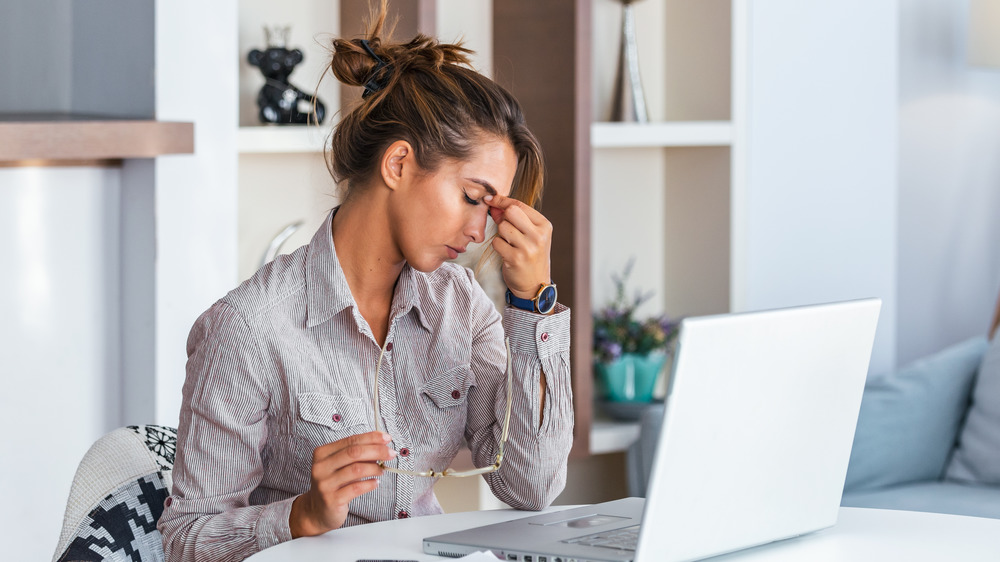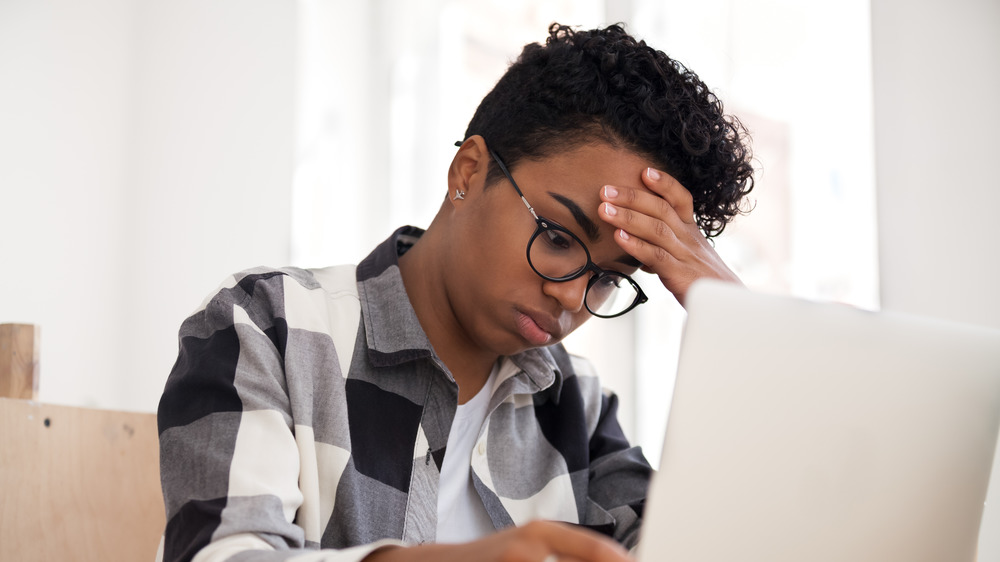What You Should Know Before Taking Anti-Anxiety Medication
Anti-anxiety medication has long been used to treat anxiety, a mental health issue that has long affected the public. However, the topic has become more widely talked about in recent years. Between a tumultuous and divided political landscape and the COVID-19 pandemic, the topic of mental health was thrust to the forefront like never before, as everyone has had to face an uncertain time — with much of it being spent at home.
Although there is no cure for anxiety, there are ways to treat its symptoms. Medication, along with therapy, are two of the most common options for treatment. Millions of people are prescribed medication for anxiety: In fact, as noted by Psychology Today, in 2013, 13.5 million people were prescribed benzodiazepines, the most common form of anti-anxiety medication. When it comes to anti-anxiety meds, there is quite a lot of information that would be helpful to know when getting started. And because the wealth of information that exists can be overwhelming, we're breaking it down for you. So, here is what you should know before taking anti-anxiety medication.
When to ask your doctor about taking anti-anxiety medication
It may come as a surprise that you should not turn to anti-anxiety medication just to deal with typical nerves that accompany common, everyday anxiety-inducing situations. However, if anxiety is affecting your daily life, you might have an anxiety disorder, and you may benefit from medication. As noted by the National Institute of Mental Health, when you have an anxiety disorder, you experience symptoms on a regular basis that begin to interfere with your daily life. If you've experienced ongoing feelings of worry and general uneasiness, difficulty concentrating, muscle tension, irritability, or trouble sleeping, you may have an anxiety disorder. And, if you've had a sudden bout of shortness of breath, sweating, or rapid heartbeat, you may have experienced a panic attack, a specific type of anxiety.
Anti-anxiety medication is one common way to treat anxiety disorders, of which the most common type is benzodiazepines, or "benzos" as they are commonly called. Common brands include Ativan, Xanax, and Klonopin (via the National Association for Mental Illness). For the purposes of this article, when it comes to anti-anxiety medication, we will focus on benzos specifically.
How does anti-anxiety medication work?
Anti-anxiety medication works by relaxing the body through sedation. According to Mind, an organization based in England, "benzodiazepines act as a sedative — slowing down the body's functions — and are used for both sleeping problems and anxiety."
The medication is so effective because it increases the effect of GABA (gamma amino butyric acid), a chemical in the brain that is responsible for logical thought, memory, emotions, and basic everyday functions like breathing.
The fact that anti-anxiety medication works so quickly has made it a go-to since the 1960s for doctors to prescribe when patients complain of ongoing anxiety. And this is a huge benefit because there are times when you need your anxiety to be eliminated quickly — be it before a major presentation or during the presence of a panic attack. During these times, time is truly of the essence, and anti-anxiety meds can be a total lifesaver.
You may be prescribed medication for short-term or long-term use
When it comes to how long you can expect to take anti-anxiety medication, it's important to note that you may be prescribed the medication for either short-term or long-term use. However, benzos are generally recommended for short-term use or as needed in those emergency situations when your body has gone into total panic mode and you need to feel better as quickly as possible, according to the National Association for Mental Illness. This could be in the midst of a panic attack or during a high-stakes exam. And if you've ever experienced a situation like this, then you know how awful it feels.
However, there are cases where you may be prescribed anti-anxiety medication for long-term use, such as if other medication or supports are unsuccessful in treating the symptoms. Some doctors do prescribe low doses of anti-anxiety meds on an ongoing basis, and, as noted by Mind, "this could be the best treatment for some people."
These are some possible short-term side effects of anti-anxiety medication
Everyone reacts differently to medication, and the same is true of anti-anxiety medication. You may develop side effects or you may have none at all, as noted by Mind. The most common side effect of anti-anxiety medication at low doses, according to Harvard Health Publishing, is daytime sleepiness, but you may not get tired from the medication at all.
Additional side effects, such as the loss of coordination and balance, are more common with higher doses of the medication. In these cases, you may be more likely to fall or be prone to other types of accidents (which we'll discuss later in more detail).
Other common side effects include light-headedness, dizziness, confusion, nausea, constipation, dry mouth, blurred vision, slurred speech, and muscle weakness (via Mind). You could, however, also experience side effects that are less common — headaches, lowered blood pressure, rashes, double vision, increased saliva, tremors, trouble urinating, loss of bladder control, and even changes in sex drive. Luckily, these side effects are not too common.
Anti-anxiety medication can cause dependency
A major reason why some doctors hesitate to prescribe anti-anxiety medications for long-term use — or at all — is because they have the potential to be addictive. This is because your body's "GABA neurons adapt to the presence of the drug" in your system, as explained by Harvard Health Publishing.
To give you a better understanding of how this can be, Mind shared one particular user's experience. "During one particularly bad time I was prescribed diazepam alongside my antidepressants. It really helped me at the time," the user said. "However, as my body got used to the drug I needed more of it to get the same effect."
However, according to an article in Psychiatric Times, long-term use of anti-anxiety medication more commonly can result in physical dependence rather than addiction. "Most benzodiazepine use is not addictive, but appropriate use can sometimes result in dependence," said Jay M. Pomerantz, MD. Harvard Health noted that physical dependence upon the medication is quite common after using the medication every day for at least two months.
Speak with your doctor about other medication you may be taking
If you're looking into anti-anxiety medication, you should first consider the medication you're already be taking. Definitely speak with your doctor and disclose all of the medication you're currently taking, including over-the-counter drugs and other medications for mental health, such as antidepressants. If you're already taking other meds that make you drowsy, adding benzos along with the others can be dangerous since you don't yet know how they could affect you, according to the National Alliance on Mental Illness.
According to Christy Huff, MD, in an article for MedShadow, the types of medication that provide the most risk in combination with benzos include opioids or painkillers (OxyContin, morphine), sleep medication (Ambien, Lunesta), acid reflux medication (Prilosec), and fluoroquinolone antibiotics (Cipro, Levaquin). In 2016, the U.S. Food and Drug Administration even added "Boxed Warnings, our strongest warnings, to the drug labeling of prescription opioid pain and prescription opioid cough medicines, and benzodiazepines."
Drinking alcohol while taking anti-anxiety medication can be dangerous
Easily the most readily available drug is alcohol, and most of us are known to enjoy a glass of wine, for example, from time to time; however, when taking anti-anxiety medication, you need to be cautious. Why the caution? Well, both alcohol and benzos are depressants, which can cause sedative effects that include drowsiness and muscle relaxation, as noted by Healthline.
And, when combining the two together, these effects are intensified. A 2018 study in animals that looked at the effects of combining alcohol with Xanax, one particular type of benzo, found that ethanol, which is found in alcoholic drinks, increases the concentration of alprazolam in our bodies (via Healthline). This then causes the liver to work harder to break down both the alcohol and the anti-anxiety medication.
Because there is generally no recommended dose when combining anti-anxiety medication with alcohol — since our bodies all react differently — the best option is to talk with your doctor about your use of alcohol so that you can ensure you're being safe.
If you plan to become pregnant, you may need to stop taking anti-anxiety medication
Pregnancy is a time when it's of the utmost importance to take care of your body for the health of your baby, so you may need to make some changes to your diet, lifestyle, and use of medication — this includes the use of anti-anxiety medication.
The Yale University School of Medicine found that women who take benzos while pregnant are "2.5 times more likely" to require a C-section to deliver their baby, according to American Addiction Centers. The use of anti-anxiety medication during pregnancy is also associated with birth defects, including low birth weight, premature delivery, cleft lip and palate, and neonatal respiratory distress. However, it should be noted that these effects are not very common and are more likely to occur while taking higher doses.
The U.S. Food and Drug Administration places benzos in category D. This means that "there is some positive evidence of human fetal risk, but the potential benefits may warrant use of benzodiazepines in pregnant women" (via American Addiction Centers). So, out of an abundance of caution, it's best to avoid taking benzos when pregnant and when trying to conceive; however, there are cases where the benefits outweigh the risks.
Memory impairment is one possible long-term side effect of anti-anxiety medication
One side effect of anti-anxiety medication that is more commonly associated with long-term use of the drug is memory loss resulting from slowed cognitive function. An article in Psychiatric Times shared that these effects are sometimes underestimated because those with anxiety disorders are generally more likely to have trouble concentrating or paying attention in the first place.
In addition to potential memory impairment, your thinking and learning may be impacted, so use of anti-anxiety medication could potentially affect your reaction time and motor coordination, according to American Family Physician.
Additionally, recent research shows a possible link between anti-anxiety medication and dementia. Another Psychiatric Times article noted that the ongoing use of anti-anxiety medication "may increase the risk for developing dementia among older adults." This is just another thing to think about when considering whether anti-anxiety medication is right for you.
Accidents may be more likely with long-term use of anti-anxiety medication
Accidents may be more likely with ongoing use of anti-anxiety medication. A Psychiatric Times article stated that "the use of benzodiazepines is associated with a 60% to 80% increase in the risk of traffic accidents." And, according to American Family Physician, driving after having taken anti-anxiety medication "is about the same as the risk of driving with a blood alcohol level between 0.050% and 0.079%."
Auto accidents are not the only type of accident that can be more likely while taking anti-anxiety medication. American Family Physician shared that hip fractures are more likely in older adults who take benzos, with one study showing an increased risk of hip fracture by 50 percent or more. This is presumably because of how the medication affects motor coordination, making falling more likely. It should also be noted that older adults, in general, are more at risk of these more serious side effects.
Although anti-anxiety medication does not affect all people in this way, it's super important to be careful when taking it.
Anti-anxiety medication can actually have an opposite effect
Anti-anxiety medication is a lifesaver for many people who need quick relief for their symptoms. However, some research shows that anti-anxiety meds can actually have the opposite, or "paradoxical," effect of relaxation in some people — a less common side effect. For example, these opposite effects may include anxiety, restlessness, agitation and irritability, aggression, delusions and hallucinations, depression, nightmares, and suicidal thoughts and behaviors. Additionally, it's possible to experience depersonalization, which refers to "feeling detached from your surroundings," and derealization, or a "feeling that your surroundings are not real," according to Mind.
There is also some evidence to suggest that long-term use of benzos can actually result in increasing underlying anxiety. Yet a study cited by Journal of Clinical Medicine suggested that this could also be attributed to the presence of symptoms from other disorders that may overlap. So, in truth, it can be pretty hard to tell the difference.
If you or anyone you know is having suicidal thoughts, please call the National Suicide Prevention Lifeline at 1-800-273-TALK (8255).
You may develop difficulty concentrating with long-term use of anti-anxiety medication
A Psychiatric Times article suggested that focus and concentration is another possible cognitive effect of long-term anti-anxiety medication use. Research shows that ongoing use of the meds can impact cognitive function when compared with individuals who do not use anti-anxiety medication. Research also shows that long-term benzo users did show improvement when it comes to focus and concentration after withdrawing from the medication, but they still showed some cognitive impairment compared with the control group. There's no need for alarm, though, because when it comes to daily functioning, the effects of the medication may be minimal.
Other good news is that there's evidence to suggest that these long-term side effects can be reversed after going without the medication for a long period of time, according to American Addiction Centers. So, it's good to know that this possible damage is not long-lasting.
Why you should speak with your doctor before stopping anti-anxiety medication
Say you've been taking anti-anxiety medication for a year when you decide that you're ready to go without. If you think you can just stop the medication cold turkey, think again. Whether you wish to go off the meds because you plan to become pregnant or you feel you're in a better head space — whatever the reason may be — we can't stress enough the importance of consulting with your doctor first. Your doctor will likely help you ween off of the medication gradually over the course of weeks or even months, minimizing the impact of any nasty withdrawal symptoms, according to the National Association for Mental Illness.
And what are some of these possible withdrawal symptoms that it's best to avoid? They include headaches, nausea, vomiting, sweating, tremors, rapid heartbeat, and muscle tension — and they even have the potential to be life-threatening. According to Harvard Health Publishing, what's tricky is that it's sometimes difficult to tell whether what you may be experiencing is a symptom of withdrawal or the presence of anxiety that has returned from being off the meds. Oh geez.
Everyone reacts a bit differently to anti-anxiety medication
It's important to keep in mind that our bodies all react differently to medication, so your doctor may have you try more than one type of anti-anxiety medication before finding the right one for you, as noted by the National Institute of Mental Health. It's also important to note that not everyone who uses anti-anxiety medication will experience these side effects. Some people experience no negative short-term and long-term side effects at all. But because there are concerns when taking any medication and the fact that research shows that some people do react in these ways, it's important to be well-informed.
If you think that anti-anxiety medication may be helpful for you, speak with your doctor. Start with your primary doctor, who can then refer you to a specialist if needed. The goal is to treat your anxiety in the best way possible. Life can be tough — now more than ever — but know that you're not alone.














